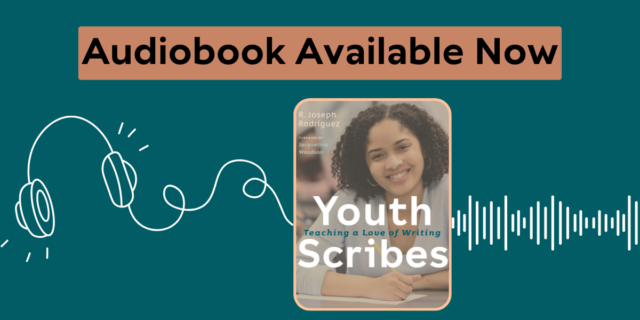
In Chapter Two of Youth Scribes: Teaching a Love of Writing, R. Joseph Rodriguez discusses “Youth Identities, Inventiveness, and Process.” Here, he shares his idea for a writing assignment (part of “A Scribe’s Studio”) around Autoethnography, which makes use of students’ background knowledge and cultural and linguistic wealth. The following is an adapted excerpt from the chapter.
Introducing Autoethnography
Introduce students to the practice of autoethnography, that is, self-discovery or reflective writing that explores experiences that are personal, historical, and descriptive. The scribes can attempt to connect their stories to meanings and understandings in their communities and extend their stories to the greater world.
- Students will be invited to share what they know about autobiographies, memoirs, and narrative accounts written by historians, literary authors, and survivors.
- Specific examples will be provided of genres to gauge students’ knowledge, interests, and preferences.
- Students will practice approaches to civility for in-person and remote learning communications and discussions.
- Students can create an autoethnography of their own with descriptive narration that considers key rhetorical literacies and scribal principles such as audience, identity, occasion, purpose, relationships, and message in their writing.
Students can examine the historical events in a region, such as the Chihuahuan or Sonoran deserts in the Southwestern borderlands, that contributes to human diasporas, migrations, and traumas and to the making of the United States, including colonialist and exceptionalist beliefs of Manifest Destiny. Two examples are offered here:
- As scribes, students can examine the author’s life stories and how these are interconnected to scribal acts, behaviors, and habits from adolescence to adulthood, including their perspectives to communicate big ideas or the arc of a scribal identity.
- They can view selected multimedia associated with the author’s work that can consist of a conversation or interview, a recorded message, or recent public remarks for a reader audience.
Inform your students that they will tell their stories and family stories as literary narratives. Tell them that many literary works such as essays, novels, plays, and poems are largely based on authors’ families and experiences.
Introduce the word autoethnography. Together, examine the roots that make up the word, and practice additional words in Greek and Latin contexts: etymology, genealogy, inheritance, legacy, and lineage, among other words. Each of these words is interconnected to scribal narratives and storytelling across time.
Modeling Autoethnographic Writing
Pat Mora’s excerpt, which appears below, presents a catalog of names and places that are interconnected to her genealogy, identity, lineage, and origin. Moreover, she names specific natural spaces and wonders that inform her life and that can be likened to a scribal identity. Careful attention is given by Mora to names, naming, and being named—whether by oneself, one’s family, or others. Mora introduces readers to a catalog listing that also includes punctuation usage and textual innovation, some against conventions and norms in academic and literary writing. In fact, she delivers in the vignette multiple stories, which are all interconnected to her sense of self and belonging. Note the affirmations she details for her audience.
Similarly to Mora, and as teachers, we can adopt an ethnographer role in the presence of our students, especially when we invite them to an autoethnography exercise that calls for our listening, openness, and trust with suspended judgment. Lisa D. Delpit reminds teachers, “[W]e must learn to be vulnerable enough to allow our world to turn upside down in order to allow the realities of others to edge themselves into our consciousness. In other words, we must become ethnographers in the true sense” (1988, 297). The realities of our students become visible when we permit their scribal lives to take form on the page or screen and before their eyes. The invitation is significant if it is to be accepted by our adolescent scribes in formation.
How can the autoethnographic dialogue begin with students? Who will offer their attention and hear and listen to the scribes? For Delpit, teachers hold more authority than they may acknowledge or give themselves credit for in our classrooms. She adds, “Teachers are in an ideal position to play [the ethnographer] role, to attempt to get all of the issues on the table in order to initiate true dialogue” (1988, 297). The dialogue we begin with our students can be sustained in a way that maintains caring relationships and mutual trust.
The following text is an excerpt from House of Houses, a family memoir by Pat Mora. The text is recommended to model nonfiction, autoethnographic writing.
| I am Patricia Mora, born in El Paso, Texas, daughter of the desert, of the border, of the Río Grande del Norte, daughter of Estela Delgado, who is the great-granddaughter of Anacleta Manquera and Nepomuceno Delgado, granddaughter of Ignacio Delgado y Manquera and María Ignacia Barragán; daughter of the circuit judge, Eduardo Luis Delgado of Cusihuirachi [sic], México, husband of María Dolores Prieto Yrigoyen, father of Eduardo Octavo, who died young, and of the fierce and loving Ignacia Raymunda, of Adelina, Elodia Natalia Zenaida, and Dolores Ester Delgado, all born in México, their father, the maternal grandfather I never knew who below Revolutionary bullets and stars, floated in a carriage with his grown daughters across the dark Río Grande [in 1910][.] (1997, 44) |
Students can apply the elements of literacy to Mora’s vignette excerpt to advance scribal acts, behaviors, habits, and identities. In particular, they can engage in the circulation of scribal ideas by applying close reading to Mora’s text and then launching a whole-group annotation exercise of the excerpt.
They can pay close attention to the author’s ideas, point of view, style, and tone. Invite students to write or create their own autoethnography with Mora’s as mentor text.



